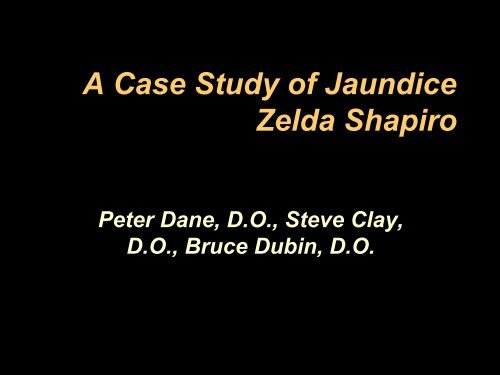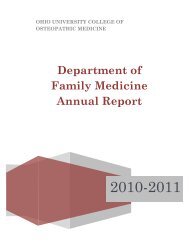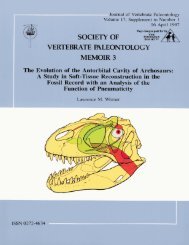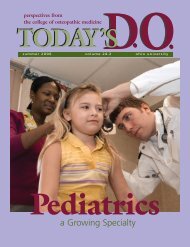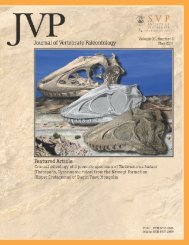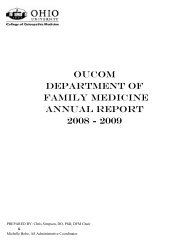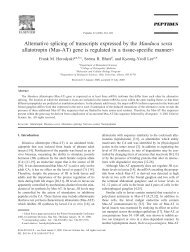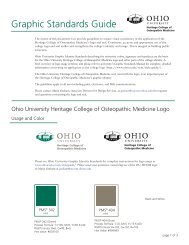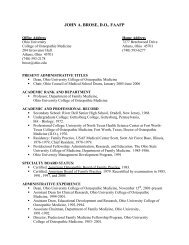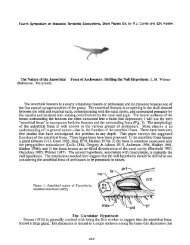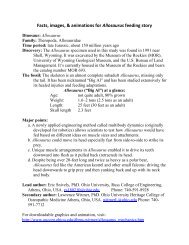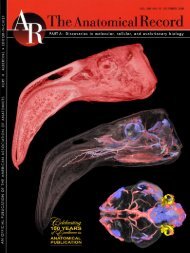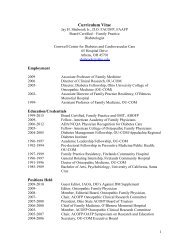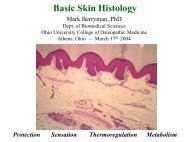A Case Study of Jaundice Zelda Shapiro
A Case Study of Jaundice Zelda Shapiro
A Case Study of Jaundice Zelda Shapiro
You also want an ePaper? Increase the reach of your titles
YUMPU automatically turns print PDFs into web optimized ePapers that Google loves.
A <strong>Case</strong> <strong>Study</strong> <strong>of</strong> <strong>Jaundice</strong><br />
<strong>Zelda</strong> <strong>Shapiro</strong><br />
Peter Dane, D.O., Steve Clay,<br />
D.O., Bruce Dubin, D.O.
Presentation<br />
• 70 year old Female presents to the<br />
Emergency Department with:<br />
--Abdominal Pain<br />
--Fever<br />
--Chills<br />
--Yellow Eyes
Presentation<br />
• You see Mrs. <strong>Shapiro</strong> on the<br />
Examination Table in a slightly bent<br />
over position with her hand touching<br />
her right upper abdomen
She Says:<br />
• “Doctor, I have this Terrible pain in<br />
my side [indicates right upper<br />
Abdominal quadrant].<br />
• What Do you Want to Ask now?
PQRST--QST<br />
• It’s been there before but it has not been<br />
this bad. It feels like a knife going right<br />
through to my back. Sometimes it gets<br />
worse for a while and then lets up for a<br />
little, but it never goes away completely.<br />
• It’s a 9 on a Scale <strong>of</strong> 0-10 and having my<br />
first child was a 10.
PQRST--PR<br />
• I felt a little queasy in my stomach<br />
this morning when I got up, but the<br />
pain really began after I ate<br />
breakfast [bacon, eggs, fried<br />
potatoes].<br />
• Sometimes the pain seems to go into<br />
my right Shoulder.
Questions<br />
• Would you ask the Patient what she<br />
thinks is going on?
She thinks:<br />
• I thought I was coming down with a<br />
bladder infection because my urine<br />
has been very dark the last few days.<br />
• But this time I don’t have to go to<br />
the bathroom every half hour and I<br />
don’t have burning when I urinate.
She Says:<br />
• I had some fever last night, about<br />
101 degrees<br />
• I feel like I have to throw up but I<br />
can’t and my husband says my eyes<br />
are yellow today.”
Questions<br />
• What History do you need to know?<br />
• What Questions do you ask?
Past History<br />
• Past Medical History:<br />
Unremarkable<br />
• Injuries:<br />
None<br />
• Immunizations: Last Td 5 years ago<br />
Flu-vac last fall<br />
• Medications:<br />
Aspirin for Fever,<br />
Frequent Antacids
Past History<br />
• Allergies: Denies any significant<br />
drug or environmental allergies.<br />
• Surgical History:<br />
Appendectomy at age 8.<br />
• Hospitalizations: Only for childbirth<br />
and Appendectomy
Questions<br />
• Anything you need to know about<br />
the patient’s Lifestyle and<br />
Behaviors?
Behaviors<br />
• Diet: Has had no appetite for the<br />
past 2 weeks. Last good meal was<br />
from Kentucky Fried Chicken 1 1/2<br />
weeks ago. Enjoys all types <strong>of</strong> food.<br />
• Exercise: Walks a half a mile,<br />
three days a week at the mall<br />
• Sleep patterns: No problems
Behaviors<br />
• Caffeine: Six cups <strong>of</strong> c<strong>of</strong>fee a day.<br />
• Alcohol: She and her husband<br />
have a bottle <strong>of</strong> wine with dinner.<br />
• Nicotine use: None, never smoked.<br />
• Substances: None used
Social History<br />
• Ms. <strong>Shapiro</strong> was born and raised in<br />
Camden, OH. And at age 19 moved<br />
to Athens, OH to work at OU.<br />
• She quit her job after her first <strong>of</strong> six<br />
children, all in good health.<br />
• She lives with her husband, a retired<br />
electrician.
Questions<br />
• Is there anything about the Patient’s<br />
Family History you need to know?
Family History<br />
• Patient has no siblings.<br />
• Father died <strong>of</strong> prostate cancer at 60.<br />
• Mother died <strong>of</strong> renal cancer at 59.<br />
• No family history <strong>of</strong> <strong>Jaundice</strong>.
Questions<br />
• How would you approach the<br />
System Review?<br />
• Your Order and Questions?
Review <strong>of</strong> Systems<br />
• Review <strong>of</strong> Systems is Unremarkable<br />
except for…...
GI Review <strong>of</strong> Systems<br />
• Intermittent bouts <strong>of</strong> right upper<br />
quadrant pain for 6-8 months,<br />
• Occurring about once every two<br />
months, lasting 6-8 hours and<br />
usually following a fatty meals.<br />
• Stools have been whitish recently.<br />
• No prior history <strong>of</strong> <strong>Jaundice</strong>.
Review <strong>of</strong> Systems<br />
• She denies chronic indigestion,<br />
pyrosis, food dyscrasias, anorexia,<br />
recurrent nausea, vomiting,<br />
diarrhea, constipation, hematemesis,<br />
or recent weight loss.
What’s Next?
The Physical Exam<br />
• How would you Approach the<br />
Physical Exam?<br />
• What’s First?
Vital Signs<br />
• Temperature: 102 o F<br />
• Height: 65 inches<br />
• Pulse: 110 bpm<br />
• Respiration’s: 22 pm<br />
• Blood Pressure: 150/90 mmHg<br />
• Weight: 190 lb.
The Physical Exam<br />
• In what order would you examine<br />
the patient?
Physical Examination<br />
Eyes: Conjunctiva have a<br />
yellowish apperance<br />
Skin: Questionable yellow<br />
coloration; no rashes or other<br />
skin lesions. Decreased skin<br />
turgor. Skin very dry.
Physical Exam<br />
• Does the type <strong>of</strong> lighting in the room<br />
affect your perception <strong>of</strong> skin<br />
yellowing in <strong>Jaundice</strong>?
Question<br />
• What causes the Skin and Sclera to<br />
turn yellow in <strong>Jaundice</strong>?
The Physical Exam<br />
• How would an Examination <strong>of</strong> the<br />
Heart and lungs be helpful in this<br />
Patient?
Physical Examination<br />
• Heart: Heart sounds are<br />
distant. Rate <strong>of</strong> 110 without<br />
murmur noted.<br />
• Lungs: Clear and equal<br />
bilaterally to auscultation and<br />
percussion.
The Physical Exam<br />
• How do you Examine a Patient’s<br />
Abdomen when in Pain?<br />
• What do you do?
Physical Examination<br />
• Ascultation before Palpation<br />
• Abdomen:<br />
--Bowel sounds quiet<br />
but present<br />
--Tender right upper<br />
Quadrant<br />
--No rebound tenderness
Question<br />
• What is the Significance <strong>of</strong> having<br />
Tenderness but not Rebound<br />
Tenderness?<br />
• What Types <strong>of</strong> Pain occur in the<br />
Abdomen and what are their<br />
Sources?
Physical Examination<br />
• Rectal:<br />
--No masses or tenderness<br />
--Hemocult negative<br />
--Stool Pale in Color
Question<br />
• What is your Differential Diagnosis<br />
at this Point?
Other Information<br />
• What Labs do you want to order?<br />
• What would they tell you?<br />
• Would they Change your Diagnosis<br />
or Treatment?
CBC<br />
• Hb 13.6 g/dl (12-16 g/dl)<br />
• Hct 40.2 % (36-45%)<br />
• RBC 4.8 X 10 6 /ml (4.2-5.0 X<br />
10 6 /ml)
CBC<br />
• WBC 14.6 X 10 3 /mm 3 (4-11 X<br />
10 3 /mm 3 )<br />
• PMN 90% (40-75%)<br />
• Lymphs 8% (15-45%)<br />
• Monos 2% ( 1-10%)
LFT’s<br />
• AST 98 IU/l (11-47 IU/ l)<br />
• ALT 102 IU/l (7-43 IU/l)<br />
• Alk Phos 345 IU/l (38-126 IU/l)<br />
• Bilirubin<br />
• Total 6.0 mg/dl (0.2-1.3 mg/dl)<br />
• Direct 5.4 mg /dl (0.0-0.2 mg/dl)
LFT’s<br />
• What do the Elevations <strong>of</strong> AST,<br />
ALT, and Alkaline Phosphatase<br />
Mean?<br />
• How do Direct and Total Bilirubin<br />
Differ?<br />
• What are their Sources?
Urinalysis<br />
• What would you Expect to find in<br />
this Patient’s urine?
Urinalysis<br />
• Appearance: dark yellow (yellow)<br />
• Acetone: negative (negative)<br />
• Glucose: negative (negative)<br />
• pH: 8.0 (4.6-8.0)<br />
• Spec. grav. 1.024 (1.003-1.030)<br />
• Urobilinogen: Positive (negative)
Question<br />
• What is your Differential Diagnosis<br />
at this Point?<br />
• Did the Lab Values help?
• What is Charcot’s Triad?<br />
Question
Labs<br />
• Gallbladder Ultrasound:<br />
--Common Bile Duct Dilatation<br />
--Cholelithiasis with Multiple<br />
Small Stones<br />
--Multiple Small Stones in the<br />
Distal Common Bile Duct<br />
--Liver & Pancreas unremarkable
Labs<br />
• What Other Tests May be Needed<br />
and Why?
Labs<br />
• Blood cultures:<br />
Pending<br />
• Chest X-ray: No acute changes<br />
• EKG: Non-specific ST changes,<br />
sinus Rhythm<br />
• Protime: 11.4 sec. (11-14 sec.)<br />
• APTT: 24 seconds (22-37 seconds)
Treatment<br />
• What options for Treatment are<br />
there?<br />
• What Rationale do you have for<br />
Each Treatment?
Treatment<br />
• The Patient Undergoes ERCP<br />
(Endoscopic retrograde<br />
cholangiopancreatography)<br />
with Improvement in her pain and<br />
<strong>Jaundice</strong> after stone removal.<br />
• Four weeks later she has an Elective<br />
Lapascopic Cholecystectomy with<br />
Operative Cholangiogram.


